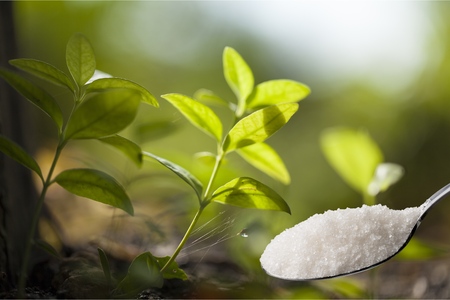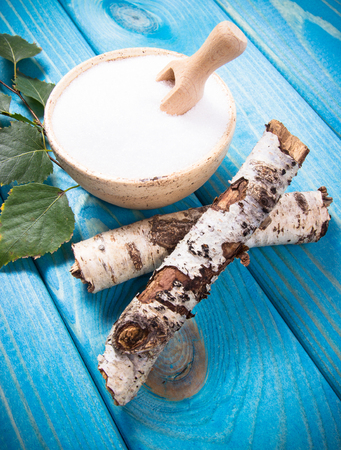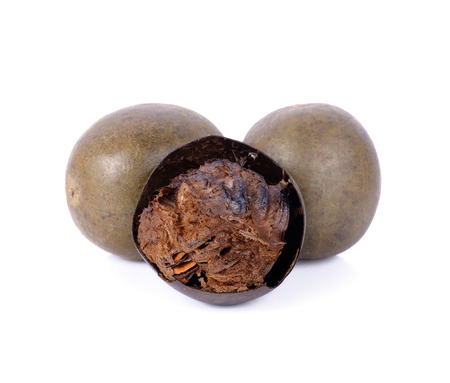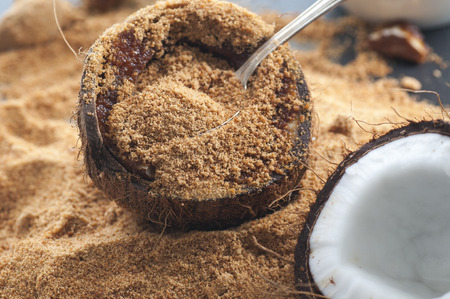Top 8 Healthy Sugar Substitutes for Baking, Coffee, Gum, and More
You’ve probably heard all the buzz about sugar—how it’s everywhere, it’s addictive, and we eat too much of it. Maybe you want to cut down on sugar (or cut it out completely) but you wonder, “are there any healthy sugar substitutes I can use?”
The answer is yes! Thankfully, there are a number of natural sweeteners out there better for you than table sugar. Here are the top eight and how you can use them for everything from your morning coffee to baking cookies.
1. Stevia: The Sweet Substitute for Everything

Stevia is perhaps the best sugar substitute out there because it’s natural and comes directly from a plant—a small shrub native to South America.
Stevia is almost 200 times sweeter than white sugar and doesn’t affect blood sugar because of its low glycemic index, making it a great sugar alternative that’s virtually calorie free. Stevioside, one of two compounds that make up stevia, has even been found to help reduce blood pressure and blood sugar.
Stevia comes in many different forms, from the pure extract to products like Truvia, which is a blend of stevia, erythritol, and natural flavors.
While it hasn’t been around in the modern world long enough to study long-term, it’s been generally recognized as safe by the FDA and is a great alternative to calorie-dense and blood sugar-spiking table sugar. That’s why it’s our top choice and great for use in moderation, along with some of the other sweeteners on this list.
How to Use Stevia as a Sugar Substitute
Stevia is a great in almost anything! Use is for baking or get it in packets for use in coffee, tea, or cereal. You can even add flavored stevia drops to your water for a tasty sugar-free and calorie-free hydrating drink.
Look for stevia in health products like protein powders, protein bars, and healthy chocolates and candies for low- or no-sugar alternatives.
2. Xylitol: Sweet and Great for Your Teeth
Xylitol is a natural sugar alcohol taken from corn cobs or trees. (In contrast, other sugar alcohols like  Spenda/sucralose and aspartame are artificial, unnatural sweeteners.) It occurs naturally in some fruits and vegetables and has about ⅓ the calories as table sugar.
Spenda/sucralose and aspartame are artificial, unnatural sweeteners.) It occurs naturally in some fruits and vegetables and has about ⅓ the calories as table sugar.
Xylitol is unique because it’s also been shown to help prevent dental caries and plaque formation on your teeth. As a sweetener, it’s a very white, light powder that has a nice sweet taste and no aftertaste.
Like Stevia, xylitol has a very low glycemic index and doesn’t have an effect on blood sugar.
How to Use Xylitol as a Sugar Substitute
Xylitol is used often as a sweetener in natural sugar-free gums, mints, tablets, and candies. Buy it as a granulated sugar substitute for baking recipes and hot drinks.
For extra dental support, look for toothpastes and mouthwashes containing xylitol.
3. Monk Fruit: Zero Calorie Tropical Sweetener
Monk fruit is a small, tropical melon grown in Southeast Asia that has been used as a digestion and cold aid in  Eastern medicine for hundreds of years. We now use make a sweetener out of it from the fruit’s juice.
Eastern medicine for hundreds of years. We now use make a sweetener out of it from the fruit’s juice.
Monk fruit sweetener is all-natural, zero glycemic, no-calorie, and is 150-200 times sweeter than sugar.
How to Use Monk Fruit as a Sugar Substitute
Monk fruit sweetener can be used in coffee, tea, juices, and other drinks, or as a sweetener for just about anything. Products like Monk Fruit in the Raw combine monk fruit with dextrose, making it easy to substitute for sugar cup by cup in baking recipes.
4. Erythritol: A Good Sugar Alcohol
Like xylitol, erythritol is another natural sugar alcohol that are bodies digest almost untouched, so it doesn’t contribute calories like sugar. It’s also a white and fine powder.
If you’re new to erythritol, be care to introduce is slowly—it can cause mild bloating or gas if consumed in larger quantities. It’s often combined with other natural sweeteners.
How to Use Erythritol as a Sugar Substitute
Instead of your normal candies, chocolates, and sodas, like for erythritol-sweetened protein powders, protein bars, all-natural sugar-free chocolates, and even healthy sodas like Zevia.
For baking and sweetener drinks, look for 100% granulated erythritol sweetener.
Natural Sweeteners Better Than Empty Sugars
While these next options do contain sugar, they contribute some nutrition that makes them good substitutes for white, refined table sugar.
5. Whole Fruit
For a whole food sweetener, plain old fruits can do the trick. If you’re looking for low-sugar options, reach of berries first: blueberries, raspberries, strawberries, or blackberries. These are lower in sugar and tend to be higher in vitamins and minerals.
Another very sweet fruit option is dates, which are packed with sweetness but provide extra vitamins, minerals, and fiber that sugar is lacking. Just take note they’re still high in sugar and calories and best used moderately as a sweetener.
How to Use Fruit as a Sugar Substitute
Add berries to oatmeal or cereal or use fruits like bananas, berries, or mangos in smoothies in the morning. Carry apples, oranges, pears, or bananas with you during the day for a sweet, portable, healthy snack.
For cooking and baking, look for recipes like these that use fruit as the main sweetener.
6. Raw Honey
Raw honey has been used for medicinal and health purposes for centuries. It’s a great source of antioxidants and phytonutrients (plant compounds that provide anti-inflammatory and antioxidant support) and is even used as a natural antiseptic for killing fungus and bacteria, especially during cold and flu seasons.
But make sure you get the right type of honey. Most brands in traditional grocery stores have been heated and processed for a better texture and color—but this removes many of the benefits. Look for raw, organic honey from a trusted provider.
How to Use Raw Honey as a Sugar Substitute
Add about a tablespoon of raw honey to hot coffee or hot tea with lemon. You can also add it to smoothies, yogurts (just make sure the yogurt is unsweetened), and salad dressings.
7. Maple Syrup
Pure, raw, organic maple syrup (the only kind we’re talking about here) is the sticky sweet sap that comes from maple trees. Although it’s still calorie dense like sugar, it has a lot of nutrition in its unprocessed form, including antioxidants, manganese, and zinc.
Like honey, maple syrup is still a sugar to enjoy in moderation.
How to Use Maple Syrup as a Sugar Substitute
Add a little maple syrup to your morning oatmeal, cereal, tea, smoothie, or in a baking recipe for a rich sweetness. Use it as a light topping for pancakes or waffles (preferably homemade and whole grain or grain-free), on yogurt, or as the sweetener in a salad dressing.
8. Coconut Sugar

Coconut sugar is a rich, brown sugar made from the coconut that is low glycemic. It can be a good replacement for white or brown sugar in baking and doesn’t affect blood sugar as much as refined sugar, although the calories are the same.
How to Use Coconut Sugar as a Sugar Substitute
Coconut sugar is great for baking or cooking recipes, in coffee or tea, smoothies, and any other way you’d use table sugar. You can even combine it with sugar-free healthy sugar substitutes like stevia, xylitol, or monk fruit sweeteners to lower the overall sugar content of a recipe.
We are lucky to live in a time when so many alternative sugar options are available. Our world is not set up for sugar-free living, but we can empower ourselves to live better through mindful choices that support health and vitality for many years to come. At Nature’s Ideal, we strive to make it easier for you with a range of health sweeteners and natural health products.
Disclaimer: Any statements made have not been evaluated by the FDA. Products mentioned are not intended to diagnose, treat, cure, or prevent any disease.
Recent Posts
-
Potassium Bromate: The Health Risks of This Sneaky Additive and How to Avoid It
Are you consuming a common bread additive that’s a possible human carcinogen?That additive is known …Dec 1st 2023 -
6 Huge Benefits of Meditation for Your Mind & Body
You’ve probably heard something about the benefits of meditation for your brain, body, stress levels …Nov 30th 2023 -
5 Natural Damaged Hair Treatments and Remedies for Healthy, Vibrant Hair Today
If your hair’s been exposed to products, appliances, dyes, or even toxic environment factors over th …Nov 30th 2023




